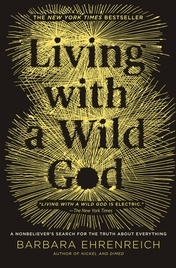Welcome to DU!
The truly grassroots left-of-center political community where regular people, not algorithms, drive the discussions and set the standards.
Join the community:
Create a free account
Support DU (and get rid of ads!):
Become a Star Member
Latest Breaking News
Editorials & Other Articles
General Discussion
The DU Lounge
All Forums
Issue Forums
Culture Forums
Alliance Forums
Region Forums
Support Forums
Help & Search
Religion
Related: About this forumFeeling the Spirit

June 1, 2016
By Scott McLemee
Examples of atheist spiritual autobiography are not plentiful, although the idea is not as self-contradictory as it perhaps sounds. A quest story that ends without the grail being located or the ring destroyed may not satisfy most audiences, but it's a quest story even so.
The one example that comes to mind is Twelve Years in a Monastery (1897) by Joseph McCabe, an English Franciscan who spent much of his clerical career grappling with doubts that eventually won out. Twelve Years is framed mainly as a critique and expose of clerical life, but its interest as a memoir comes in part from McCabe’s struggle to accept the moral and intellectual demands imposed by his growing skepticism. For all of its defects, monasticism offered a career in which McCabe’s talents were recognized and even, within ascetic limits, rewarded. Leaving it meant answering the call of a new vocation: He went on to write on an encyclopedic array of scientific, cultural and historical topics.
McCabe also became the translator and primary English spokesman for Ernst Haeckel, the German evolutionary theorist and advocate of pantheism, which seems to have squared easily enough with the lapsed monk’s atheism. (There may be more than a semantic difference between thinking of God and the universe as identical and believing there is no God, just universe. But if so, it is largely in the eye of the beholder.)
Barbara Ehrenreich’s background could not be more different from Joseph McCabe’s. In Living With a Wild God: A Nonbeliever’s Search for the Truth About Everything (Hachette/Twelve) she describes her working-class family as consisting of atheists, rationalists, and skeptics for at least a couple of generations back. “God is an extension of human personality,” she wrote in her journal as an adolescent, “brought into the world and enslaved as man’s glorifier.” McCabe would have had to do penance for such a thought; in Ehrenreich’s case, it was just dinner-table wisdom -- expressed with precocious verbal finesse, later honed into a sharp instrument of social criticism put to work in Nickle and Dimed, among other books.
https://www.insidehighered.com/views/2016/06/01/essay-barbara-ehrenreichs-living-wild-god
2 replies
 = new reply since forum marked as read
Highlight:
NoneDon't highlight anything
5 newestHighlight 5 most recent replies
= new reply since forum marked as read
Highlight:
NoneDon't highlight anything
5 newestHighlight 5 most recent replies
Feeling the Spirit (Original Post)
rug
Jun 2016
OP
Jim__
(15,134 posts)1. Definitely a book worth reading. *** SPOILERS ***
A little bit more around the quote from the article:
In the next few minutes, on that empty street, I found whatever I had been looking for since the articulation of my quest, or perhaps, given my mental passivity at the moment, whatever had been looking for me. Here we leave the jurisdiction of language, where nothing is left but the vague gurgles of surrender expressed in words like "ineffable" and "transcendent." For most of the intervening years, my general thought has been: If there are no words for it, then don't say anything about it. Otherwise you risk slopping into "spirituality", which is, in addition to being a crime against reason, of no more interest to other people than your dreams.
But there is one image, handed down over the centuries, that seems to apply, and that is the image of fire, as in the "burning bush." At some point in my predawn walk - not at the top of a hill or the exact moment of sunrise, but in its own good time - the world flamed into life. How else to describe it? There were no visions, no prophetic voices or visits by totemic animals, just this blazing everywhere. Something poured into me and I poured out into it. This was not the passive beatific merger with "the All," as promised by the Eastern mystics. It was a furious encounter with a living substance that was coming at me through all things at once, and one reason for the terrible wordlessness of the experience is that you cannot observe fire really closely without becoming part of it. Whether you start as a twig or as a gorgeous tapestry, you will be recruited into the flame and made indistinguishable from the rest of the blaze.
But there is one image, handed down over the centuries, that seems to apply, and that is the image of fire, as in the "burning bush." At some point in my predawn walk - not at the top of a hill or the exact moment of sunrise, but in its own good time - the world flamed into life. How else to describe it? There were no visions, no prophetic voices or visits by totemic animals, just this blazing everywhere. Something poured into me and I poured out into it. This was not the passive beatific merger with "the All," as promised by the Eastern mystics. It was a furious encounter with a living substance that was coming at me through all things at once, and one reason for the terrible wordlessness of the experience is that you cannot observe fire really closely without becoming part of it. Whether you start as a twig or as a gorgeous tapestry, you will be recruited into the flame and made indistinguishable from the rest of the blaze.
rug
(82,333 posts)2. "Here we leave the jurisdiction of language . . . ."